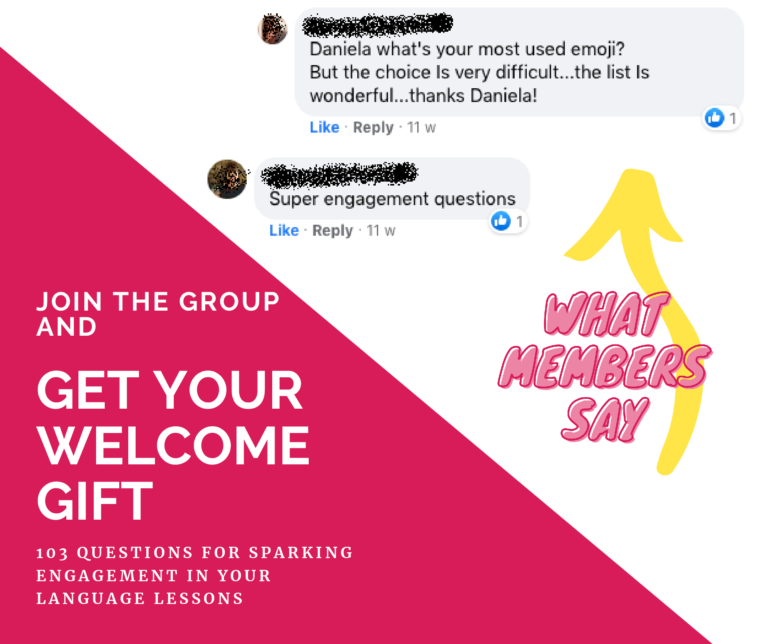
The 3 activities for speaking skills in the classroom I picked for you in this article aim at sorting out 3 challenges all language teachers face: how to introduce speaking activities for the first time to students (and to avoid what-the-heck-is-this? effect by the students); how to deal with different skills level within a classroom; how to create a constructive and positive learning experience that motivates your students.
Before diving into this piece of blog, get ready with your Top 3 Speaking Activities free guide. You can download it below:
While the free guide is on its way to your mailbox, let’s have a look at what those 3 exercises are at a glance, why they are effective and how they will help you to solve the 3 challenges mentioned at the beginning of this article.
What are the top 3 activities for speaking skills in the classroom I picked for you?
Yes, I am really fond of these 3 exercises and I couldn’t plan any course without them. They are called:
- Is this seat taken?
- I (verb) because…
- Basic storytelling.
Is this seat taken?
Is this seat taken? is a drama game I like to propose at the very beginning of my language courses. If you are a language teacher and you have joined in the Learn English through Drama language course in London with one of the native English teachers from my team, you know what I’m talking about. This drama exercise is a great way to kick off language courses, regardless of the educational setting. Basically, you would give the students the chance to pick an inspiring character they would choose for themselves. Afterwards, they would introduce themselves (into their characters) by taking the stage one by one. This exercise allows everyone in the group to take it in turn with speaking in a very spontaneous and gradual way. The teacher would be “in role” (meaning, he/she takes part in the exercise) and facilitates the exercise flow by asking questions and inviting the students to take turn.
Also, the game offers the chance to assess your students’ speaking level without they are even aware of that. Furthermore, it opens the course with a fresh twist, which usually pushes the students to think about what is next with an open mind – not bad!
Furthermore, each student would contribute according to their actual skills. Because they would act into their characters, this trick helps to lower the anxiety level.
Try it for kicking off your next language course, your students will love it and you will enjoy it, too. Guaranteed!
I (verb) because…
You give a verb and the students would make up sentences where that verb is included, such as in the sentence “I ___(verb)___ because…”, and they explain the reason why that happened. This game is very fun when students take their turn by throwing a ball to each other. Also, you can organise the exercise as a game to be played in teams. In the free guide you can find more details about this.
This game is simple to explain and for the students to deliver, which means more room for fun and actual speaking!
For more advanced students this game would work as a nice warm-up exercise, whilst for less confident students the same game would work as a gentle introduction to speaking.
Basic storytelling
The teacher would give out one lexical unit to each student. Students would take it in turn to telling a part of an improvised story by using their given lexical units. Again, another choral activity (together with Is this seat taken?) where the students collaborate together for creating an improvised story.
Find out more details in the free guide, if you haven’t downloaded yet:
Why do these activities really help to develop your students’ speaking skills?
As I wrote at the beginning of this article, the 3 activities for speaking skills in the classroom presented above aim at tackling 3 challenges:
- Introducing speaking activities for the first time
- Dealing with different skills level within a classroom
- Creating a constructive and positive learning experience that motivates the students.
I picked those specific 3 activities for speaking skills in the classroom because they are totally suitable both for students who are not familiar with drama games and for teachers who need to become familiar with language by drama teaching. The instructions are simple to explain and they offer a gentle introduction to drama work for language learning. These exercises are so enjoyable that I have never seen anyone rejecting to join in.
Another important strength of these three activities for speaking skills in the classroom is that they give room for different skills levels to show up. Everyone in the group would feel free to take part in the exercises just because the priority becomes delivering a message, expressing something interesting, or fun or creative. In other words, the success of these games doesn’t depend on the quality of the contribution made by each student. On the contrary, students would contribute as they can. Pronunciation flaws and grammar mistakes are allowed as part of the game, as long as all students are committed to taking part in the game. Obviously, you will need to reframe and fix any mistakes later during the debrief.
As a consequence, you would create a positive and constructive learning experience. Your students would learn that speaking can be enjoyable, fun and stress-free. More importantly, they would learn they can feel free and safe in expressing themselves.
All this reinforces my point about the relationship between language teaching and the use of games and drama: teaching languages through drama and games makes learning:
- Progressive
- Inclusive
- Engaging and motivating.
Wrapping up
A progressive, inclusive and motivating learning experience is pretty much a perfect learning experience. My goal with the 3 activities for speaking skills in the classroom I picked for you here is to invite you to try them in your next lessons. I recommend to download the complete guide (see below) for more details and tips. Enjoy it!
Want more support?
Join the Facebook group Independent Language Teachers Collective to get daily advice, tons of free training and to branch out with other independent language teachers like you!
ALSO…
Available only for the Collective members: free list 103 question for sparking engagement in your language lessons.
This is what members say about the freebie:

Join in the Collective and grab your welcome gift:


